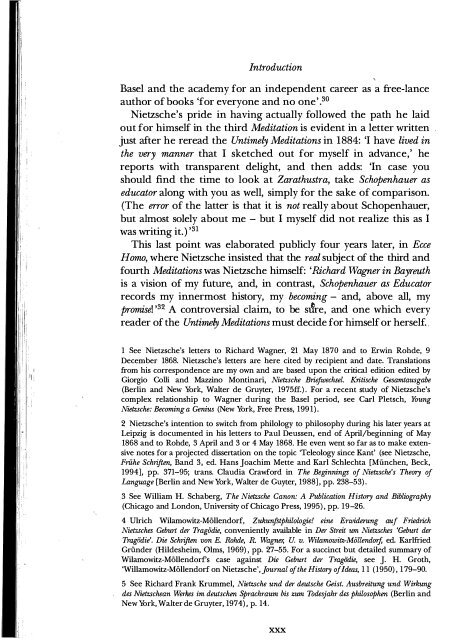Friedrich_Nietzsche - Untimely_Meditations_(Cambridge_Texts_in_the_History_of_Philosophy__1997)
Friedrich_Nietzsche - Untimely_Meditations_(Cambridge_Texts_in_the_History_of_Philosophy__1997)
Friedrich_Nietzsche - Untimely_Meditations_(Cambridge_Texts_in_the_History_of_Philosophy__1997)
You also want an ePaper? Increase the reach of your titles
YUMPU automatically turns print PDFs into web optimized ePapers that Google loves.
IntroductionBasel and <strong>the</strong> academy for an <strong>in</strong>dependent career as a free-lanceauthor <strong>of</strong> books 'for everyone and no one' .30<strong>Nietzsche</strong>'s pride <strong>in</strong> hav<strong>in</strong>g actually followed <strong>the</strong> path he laidout for himself <strong>in</strong> <strong>the</strong> third Meditation is evident <strong>in</strong> a letter writtenjust after he reread <strong>the</strong> <strong>Untimely</strong> <strong>Meditations</strong> <strong>in</strong> 1884: 'I have lived <strong>in</strong><strong>the</strong> very manner that I sketched out for myself <strong>in</strong> advance,' hereports with transparent delight, and <strong>the</strong>n adds: 'In case youshould f<strong>in</strong>d <strong>the</strong> time to look at Zarathustra, take Schopenhauer aseducator along with you as well, simply for <strong>the</strong> sake <strong>of</strong> comparison.(The error <strong>of</strong> <strong>the</strong> latter is that it is not really about Schopenhauer,but almost solely about me - but I myself did not realize this as Iwas writ<strong>in</strong>g it.) '31This last po<strong>in</strong>t was elaborated publicly four years later, <strong>in</strong> EcceHomo, where <strong>Nietzsche</strong> <strong>in</strong>sisted that <strong>the</strong> real subject <strong>of</strong> <strong>the</strong> third andfourth <strong>Meditations</strong> was <strong>Nietzsche</strong> himself: 'Richard Wagner <strong>in</strong> Bayreuthis a vision <strong>of</strong> my future, and, <strong>in</strong> contrast, Schopenhauer as Educatorrecords my <strong>in</strong>nermost history, my becom<strong>in</strong>g - and, above all, mypromise! '32 A controversial claim, to be s re, and one which everyreader <strong>of</strong> <strong>the</strong> <strong>Untimely</strong> <strong>Meditations</strong> must decide for himself or herself. ,1 See <strong>Nietzsche</strong>'s letters to Richard Wagner, 21 May 1870 and to Erw<strong>in</strong> Rohde, 9December 1868. <strong>Nietzsche</strong>'s letters are here cited by recipient and date. Translationsfrom his correspondence are my own and are based upon <strong>the</strong> critical edition edited byGiorgio Colli and Mazz<strong>in</strong>o Mont<strong>in</strong>ari, <strong>Nietzsche</strong> BrieJwechsel. Kritische Gesamtausgabe(Berl<strong>in</strong> and New York, Walter de Gruyter, 1975ff.) . For a recent study <strong>of</strong> <strong>Nietzsche</strong>'scomplex relationship to Wagner dur<strong>in</strong>g <strong>the</strong> Basel period, see Carl PIetsch, Young<strong>Nietzsche</strong>: Becom<strong>in</strong>g a Genius (New York, Free Press, 1991).2 <strong>Nietzsche</strong>'s <strong>in</strong>tention to switch from philology to philosophy dur<strong>in</strong>g his later years atLeipzig is documented <strong>in</strong> his letters to Paul Deussen, end <strong>of</strong> April/beg<strong>in</strong>n<strong>in</strong>g <strong>of</strong> May1868 and to Rohde, 3 April and 3 or 4 May 1868. He even went so far as to make extensivenotes for a projected dissertation on <strong>the</strong> topic 'Teleology s<strong>in</strong>ce Kant' (see <strong>Nietzsche</strong>,Friihe Schriften, Band 3, ed. Hans Joachim Mette and Karl Schlechta [Mi<strong>in</strong>chen, Beck,1994], pp. 371-95; trans. Claudia Crawford <strong>in</strong> The Beg<strong>in</strong>n<strong>in</strong>gs <strong>of</strong> <strong>Nietzsche</strong>'s Theory <strong>of</strong>Language [Berl<strong>in</strong> and New York, Walter de Guyter, 1988], pp. 238-53).3 See William H. Schaberg, The <strong>Nietzsche</strong> Canon: A Publication <strong>History</strong> and Bibliography(Chicago and London, University <strong>of</strong> Chicago Press, 1995), pp. 19-26.4 Ulrich WilamowitzMollendorf, Zukunfstphilologie! e<strong>in</strong>e Erwiderung auf <strong>Friedrich</strong><strong>Nietzsche</strong>s Geburt der Tragifdie, conveniently available <strong>in</strong> Der Streit um <strong>Nietzsche</strong>s 'Geburt derTragiidie'. Die Schriften von E. Rohde, R. Wagner, U. v. Wilamowitz-M5llendorj, ed. KarlfriedGrunder (Hildesheim, Olms, 1969) , pp. 27-55. For a succ<strong>in</strong>ct but detailed summary <strong>of</strong>Wilamowitz-Mollendorfs case aga<strong>in</strong>st Die Geburt der Tragifdie, see J. H. Groth,'Willamowitz-Mollendorf on <strong>Nietzsche</strong>', Journal <strong>of</strong> <strong>the</strong> <strong>History</strong> <strong>of</strong> Ideas, 11 (1950) , 179-90.5 See Richard Frank Krummel, <strong>Nietzsche</strong> und der deutsche Geist. Ausbreitung und Wirkungdes <strong>Nietzsche</strong>an Werkes im deutschen sprachraum his zum Todesjahr des philosophen (Berl<strong>in</strong> andNew Yo rk, Walter de Gruyter, 1974), p. 14.xxx


